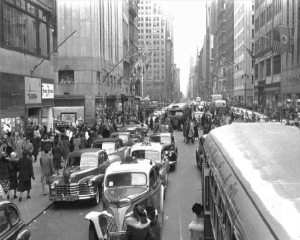Another famous actor was James Dean, best known for the nineteen fifty-five movie "Rebel without a Cause." That same year he died in a car accident at the age of twenty-four. In literature, there were writers and poets who came to be known as the "Beat Generation." These included Jack Kerouac, Gregory Corso and Allen Ginsberg. To them, much of life in nineteen-fifties America was empty and meaningless. The painter Jackson Pollock represented a spirit of rebellion in art. Pollock would drop paint onto a canvas. What did his works mean? People had to decide for themselves.
In music, the rebel was Elvis Presley -- the king of rock and roll. Elvis was a twenty-one-year-old truck driver when he sang on television for the first time. Some parents and religious leaders thought he was a bad influence. They thought the way he moved his body to the music was too suggestive. But young people screamed for more. They listened to Elvis' music on records, on the radio and on the television program "American Bandstand." "American Bandstand" became the most popular dance party in America. Every week, young people danced to the latest songs in front of the TV cameras. But it wasn't all rock and roll. Whether on Bandstand-type television programs or at local "record hops," or at home, young Americans – and their parents – danced cheek to cheek to romantic ballads as well.
Television in the nineteen-fifties included dramas acted live on TV. And there were quiz shows, and game shows, and comedy programs. If Elvis was the king of rock and roll, Lucille Ball was the queen of comedy. During the nineteen fifties, millions of Americans watched "I Love Lucy." Lucille Ball starred with her husband Desi Arnaz. They played Lucy and Ricky Ricardo. Ricky is a Cuban bandleader in New York. Lucy is a housewife who wishes she could be famous like her husband. What'll I have to do? You gonna get me back on the television show. How? I don't know how. But, if you don't, I'll... I will, Ricky. I'll get you back on the show. Don't even think of what you'll do if I don't.

Lucille Ball and "I Love Lucy" were both big influences on generations of entertainers and TV comedy producers. Variety shows offered a mix of entertainment. Americans watched shows hosted by comics like Milton Berle, Jackie Gleason and Sid Caesar. Ed Sullivan was not a comedian, but for years his show brought new acts into American homes every Sunday night. Television shows were all in black-and-white. But one night in nineteen fifty-three, Americans got their own time-machine glimpse into the future of TV. It happened with an announcement during Sid Caesar's "Your Show of Shows." "This is Richard Harkness in Washington. This week will long be remembered in the annals of television, for on Thursday December seventeenth, the Federal Communications Commission approved Compatible Color Television." That meant that owners of TV sets could still watch programs broadcast in color, in black and white, instead of having to buy a new set. Color TV's popularity grew quickly, and the prices of color TVs came down, meaning more color TVs in American homes...and more and more programs produced in color.
"The Following program is brought to you in Living Color on NBC." During the nineteen fifties, most of the people who appeared on television were white. If black actors appeared, they were usually in jobs working for white people. But in real life, a civil rights movement was beginning to gather strength. Legal battles were fought to end racial separation, especially in public schools. In nineteen fifty-four, the United States Supreme Court made a historic ruling. The case was known as Brown v. Board of Education. The court ruled that the requirement in some states for racially separate schools was unconstitutional. The court rejected the idea that schools for black students could be "separate but equal" to those attended by white students. By the nineteen sixties, the civil rights movement would shake American society. Dwight Eisenhower was president for most of the nineteen fifties. He faced the problems of communism, nuclear threats and racial tensions. "Ike" had a calm way of speaking to the public. Many Americans saw him as a fatherly president. They thought that even in a dark and dangerous world, everything would be all right.












